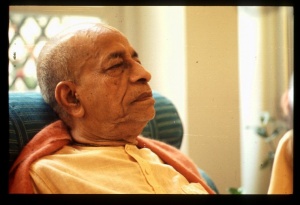SB 6.11.10: Difference between revisions
m (1 revision(s)) |
m (Text replacement - "==== <div class=" to "==== <div class=") |
||
| Line 1: | Line 1: | ||
{{info | {{info | ||
|speaker= | |speaker=Śukadeva Gosvāmī | ||
|listener=King | |listener=King Parīkṣit | ||
}} | }} | ||
[[Category:Srimad-Bhagavatam - Canto 06 Chapter 11]] | |||
[[Category:Bhagavatam Verses Spoken by Sukadeva Gosvami - Vanisource|061110]] | |||
<div style="float:left">'''[[Srimad-Bhagavatam]] - [[SB 6|Sixth Canto]] - [[SB 6.11: The Transcendental Qualities of Vrtrasura|Chapter 11: The Transcendental Qualities of Vṛtrāsura]]'''</div> | |||
<div style="float:right">[[File:Go-previous.png|link=SB 6.11.9]] '''[[SB 6.11.9]] - [[SB 6.11.11]]''' [[File:Go-next.png|link=SB 6.11.11]]</div> | |||
{{RandomImage}} | |||
==== TEXT 10 ==== | ==== TEXT 10 ==== | ||
<div class="verse"> | |||
<div | :sa indra-śatruḥ kupito bhṛśaṁ tayā | ||
sa indra-śatruḥ kupito bhṛśaṁ tayā | :mahendra-vāhaṁ gadayoru-vikramaḥ | ||
mahendra-vāhaṁ gadayoru-vikramaḥ | :jaghāna kumbha-sthala unnadan mṛdhe | ||
jaghāna kumbha-sthala unnadan mṛdhe | :tat karma sarve samapūjayan nṛpa | ||
tat karma sarve samapūjayan nṛpa | |||
</div> | </div> | ||
| Line 17: | Line 22: | ||
==== SYNONYMS ==== | ==== SYNONYMS ==== | ||
<div class="synonyms"> | |||
<div | ''saḥ''—that; ''indra-śatruḥ''—Vṛtrāsura; ''kupitaḥ''—being angry; ''bhṛśam''—very much; ''tayā''—with that; ''mahendra-vāham''—the elephant who is the carrier of Indra; ''gadayā''—by the club; ''uru-vikramaḥ''—who is famous for his great strength; ''jaghāna''—struck; ''kumbha-sthale''—on the head; ''unnadan''—roaring loudly; ''mṛdhe''—in that fight; ''tat karma''—that action (striking the head of Indra's elephant with the club in his left hand); ''sarve''—all the soldiers (on both sides); ''samapūjayan''—glorified; ''nṛpa''—O King Parīkṣit. | ||
</div> | </div> | ||
| Line 25: | Line 29: | ||
==== TRANSLATION ==== | ==== TRANSLATION ==== | ||
<div class="translation"> | |||
<div | |||
O King Parīkṣit, the powerful Vṛtrāsura, the enemy of King Indra, angrily struck the head of Indra's elephant with that club, making a tumultuous sound on the battlefield. For this heroic deed, the soldiers on both sides glorified him. | O King Parīkṣit, the powerful Vṛtrāsura, the enemy of King Indra, angrily struck the head of Indra's elephant with that club, making a tumultuous sound on the battlefield. For this heroic deed, the soldiers on both sides glorified him. | ||
</div> | </div> | ||
__NOTOC__ | |||
<div style="float:right; clear:both;">[[File:Go-previous.png|link=SB 6.11.9]] '''[[SB 6.11.9]] - [[SB 6.11.11]]''' [[File:Go-next.png|link=SB 6.11.11]]</div> | |||
__NOTOC__ | |||
__NOEDITSECTION__ | |||
Revision as of 15:36, 14 November 2018

A.C. Bhaktivedanta Swami Prabhupada
TEXT 10
- sa indra-śatruḥ kupito bhṛśaṁ tayā
- mahendra-vāhaṁ gadayoru-vikramaḥ
- jaghāna kumbha-sthala unnadan mṛdhe
- tat karma sarve samapūjayan nṛpa
SYNONYMS
saḥ—that; indra-śatruḥ—Vṛtrāsura; kupitaḥ—being angry; bhṛśam—very much; tayā—with that; mahendra-vāham—the elephant who is the carrier of Indra; gadayā—by the club; uru-vikramaḥ—who is famous for his great strength; jaghāna—struck; kumbha-sthale—on the head; unnadan—roaring loudly; mṛdhe—in that fight; tat karma—that action (striking the head of Indra's elephant with the club in his left hand); sarve—all the soldiers (on both sides); samapūjayan—glorified; nṛpa—O King Parīkṣit.
TRANSLATION
O King Parīkṣit, the powerful Vṛtrāsura, the enemy of King Indra, angrily struck the head of Indra's elephant with that club, making a tumultuous sound on the battlefield. For this heroic deed, the soldiers on both sides glorified him.